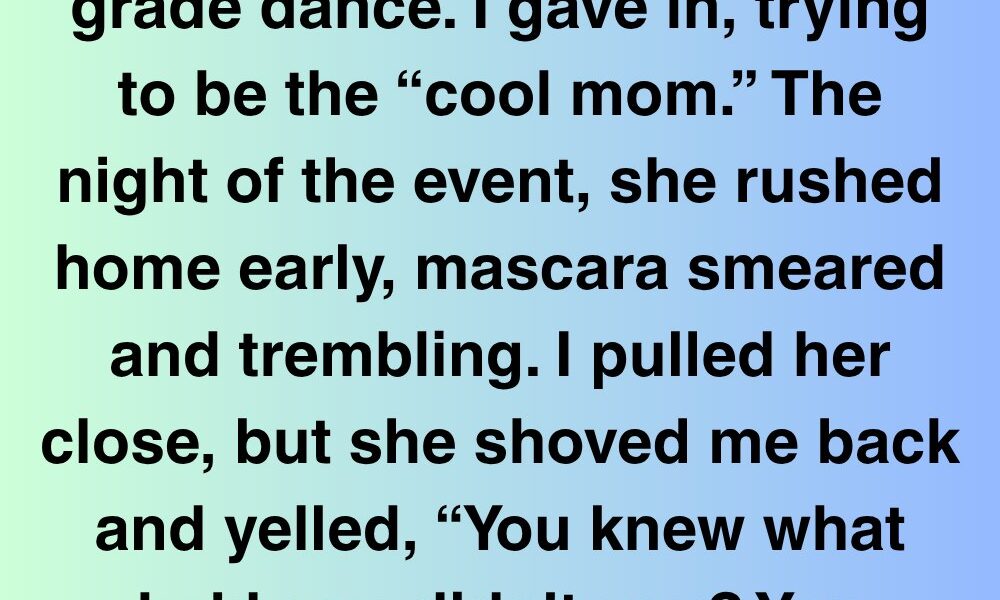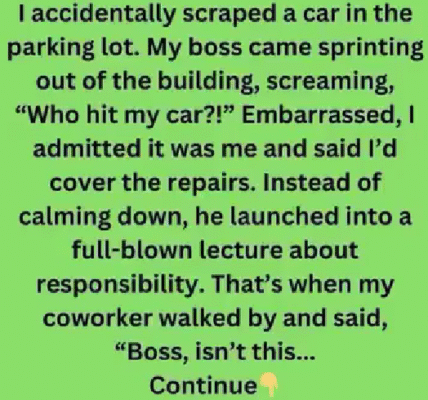My Daughter Begged To Dye Her Hair Blue—Then Accused Me Of Knowing What He’d Say
My daughter begged to dye her hair blue before the eighth-grade dance. I gave in, trying to be the “cool mom.” The night of the event, she rushed home early, mascara smeared and trembling. I pulled her close, but she shoved me back and yelled, “You knew what he’d say, didn’t you? You knew…”
At first, I just stood there, stunned. My husband, Rafiq, looked up from the couch, concern etched into every line of his face. But before either of us could say anything, Zahra had bolted into her room and slammed the door so hard a picture fell off the wall.
I followed her quietly, knocked once. No answer. I sat on the floor outside her room, knees aching, and waited. After about ten minutes, I said gently, “Zahra, please. Just talk to me.”
“Why would I? You set me up,” she said, voice muffled by the door and probably a pillow. “You knew he’d humiliate me.”
It took another half hour before she cracked the door open. Her eyeliner was streaked down her cheeks, and her lips were trembling. She looked like a child again, not a teenager caught in the whiplash of middle school drama.
I pulled her into my arms. She let me this time, but barely. “Who?” I asked softly. “Who said something to you?”
Her eyes filled again. “Grandpa. He was at the dance. With the PTA or something. And he said I looked like a clown. In front of Evan.”
That hit me square in the gut. My dad, Majid, had always been blunt—old school, opinionated, kind when he wanted to be—but never cruel to Zahra. At least, not that I’d seen.
“He was at the dance?” I asked, confused. “He didn’t tell me that.”
“He was helping with parking or something. He saw me walking in and said, ‘What did your mother do to you? You look ridiculous.’ And Evan was right there.”
Her voice cracked at Evan’s name. I didn’t know much about him, except that he was the boy she’d been talking about for weeks. She had even picked out a turquoise scrunchie to match her new hair—she’d planned everything down to the glitter on her nails.
I wrapped my arms tighter around her. “I didn’t know he’d be there. I swear to you.”
“But you knew how he is,” she said bitterly. “You grew up with him. You knew he’d say something like that.”
She wasn’t wrong.
My father wasn’t cruel, not deliberately. But he had this deep belief that appearances mattered—clean shoes, trimmed hair, “proper” colors. Blue hair, to him, was a cry for attention, and attention was dangerous, especially for girls. That’s the kind of lesson he drilled into me growing up.
I remembered being fourteen, walking into the living room in a pair of bell-bottom jeans my cousin had passed down to me. He’d made me change. Said they were “too American.” I cried all night.
“I wanted to be different,” Zahra said, pulling back to wipe her face. “Not boring. Not invisible. And he made me feel disgusting.”
“You’re not disgusting,” I said, firm. “You looked amazing tonight. And you were brave.”
She didn’t respond, just turned away and curled into her blanket.
The next morning, she skipped breakfast and barely looked at me before heading to school. I called my dad.
“You went to the dance?” I asked without greeting.
“Of course,” he said casually. “They needed volunteers for parking. I saw Zahra.”
“What did you say to her?”
There was a pause. “Nothing terrible. Just surprised by the hair. She used to be such a pretty girl.”
“She still is. And she came home crying.”
“She’ll get over it,” he said. “Kids these days are too soft. A little teasing never killed anyone.”
I couldn’t even speak for a second. My mouth went dry.
“She was humiliated,” I said finally. “You embarrassed her in front of the boy she liked. You don’t get to brush that off.”
He gave this little huff, like I was being dramatic. “If that boy was decent, blue hair wouldn’t matter. Maybe he’s not worth her time.”
Maybe he was right about that part—but that wasn’t the point.
That night, I tried to make Zahra’s favorite dinner—spaghetti with mushroom cream sauce—but she pushed the food around her plate and asked if she could go upstairs.
I let her.
Over the next few days, she got quieter. Didn’t talk about school. Wore hats over her hair, even indoors. It wasn’t just the Evan thing—she’d lost something else. That spark, that silly, chaotic confidence she’d always had.
I wanted to fix it. I also knew I couldn’t.
So I did what I could do.
I called my dad again.
“I need you to talk to her,” I said. “And not to defend yourself. Just to listen.”
“She won’t want to talk to me.”
“That might be true. But if you care about her, you’ll try.”
He resisted, of course. Said maybe I was letting her get too attached to her emotions. But I kept pushing.
After a long pause, he said, “Fine. I’ll come by Sunday.”
When Sunday came, he showed up with flowers, like that would make everything better. Zahra didn’t even look at him. She barely said two words at lunch.
Eventually, I left the two of them in the living room. I hovered by the kitchen, pretending to wipe down already clean counters. I heard him start talking, low at first. I couldn’t hear every word, but I caught phrases:
“I didn’t mean it like that.”
“You reminded me of your mother once, in that leather jacket…”
“I forget sometimes that you’re not a little girl anymore.”
Still, Zahra didn’t say much. At least not to him.
That night, I found her brushing out her hair in the bathroom mirror.
“I think I want to go back to brown,” she said softly.
“You sure?”
“Yeah,” she said. “I liked it. But now it just reminds me of… all that.”
So we made an appointment that week.
The blue faded out in streaks. She looked older with the brown again, more reserved. But not defeated. Just… cautious.
I figured the whole thing would fade eventually. She’d bounce back.
But about a month later, the real twist came.
We were at the school’s spring fundraiser—some carnival-type event with food trucks and dunk tanks. I was helping at the ticket booth when a woman I barely recognized walked up.
“You’re Zahra’s mom, right?” she asked.
I nodded.
“I just wanted to say thank you. My daughter, Nalani, told me how Zahra stood up for her in gym last week. Said some boys were making fun of her weight, and Zahra shut them down hard. Even told the teacher.”
I blinked. “She did?”
“Oh yeah. Nalani came home crying—happy crying—for the first time in months. Said Zahra told the boys, ‘People say stupid things when they’re insecure. That doesn’t mean she has to believe them.’”
I stood there, a lump forming in my throat.
That night, I asked Zahra about it. She shrugged. “They were jerks. Nalani’s nice.”
“But that’s not all, right?”
She hesitated. “I guess… I knew what it felt like. To have someone humiliate you in front of people.”
And there it was. The heartbreak that had planted something stronger in her.
She had turned pain into protection.
“You’re amazing,” I said. “You really are.”
She smiled, small and genuine.
And then, the next morning, another curveball.
My dad called. Not to argue. Not to lecture.
But to say he was proud of her.
“I saw that girl she helped at school,” he said. “I didn’t know Zahra had that kind of strength. Maybe I was wrong. About the hair. About… how much she could handle.”
It was the closest he’d come to apologizing.
And a week later, he did more than just talk.
He showed up to Zahra’s choir recital. Sat right in the front row, blue tie around his neck.
Blue.
Zahra saw it the moment she stepped on stage. She faltered, just a second—but then lifted her chin and sang her solo with this bold, beautiful clarity I hadn’t heard from her in months.
Afterward, he hugged her and said, “You know, I don’t get the hair thing. But I get you. And that matters more.”
Zahra didn’t say much. Just hugged him back, a little tighter than I expected.
That night, as I sat with her on the couch, she said, “I think he’s trying.”
“Yeah,” I said. “I think we all are.”
So here’s the thing.
Being a mom isn’t about getting every call right. I didn’t predict what my dad would say. I didn’t realize how deep that wound would cut. But I listened. And I stayed.
Zahra taught me something, too.
That sometimes, strength isn’t loud or perfect or defiant. Sometimes it’s quietly standing up for someone else, even when you’re still healing yourself.
She’s still her. Even with brown hair.
And next time she wants to try purple? I’m all in.
Because it’s not about the hair.
It’s about the voice she’s finding underneath it.
If this hit home for you—especially the part about family, apologies, or just raising strong kids—drop a like or share. You never know who needs to read it.



